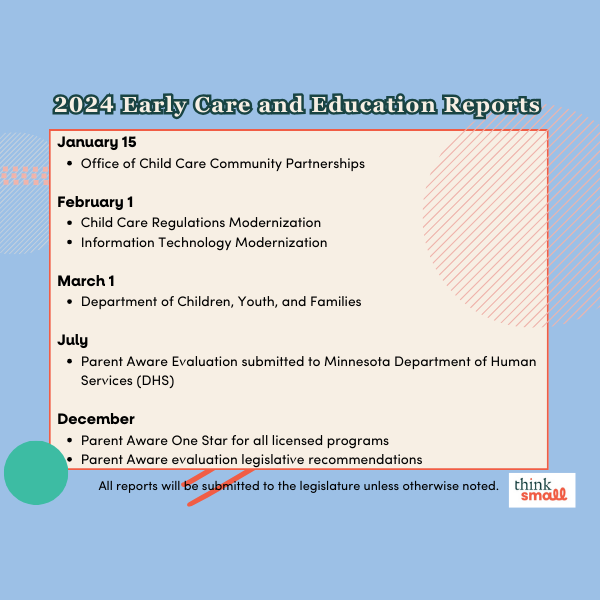By Marie Huey, Think Small Policy and Advocacy Coordinator
While the state legislative session is heating up in Minnesota, there’s also plenty to discuss about what is going on with Congress in Washington, D.C. To catch us up on the chatter related to early childhood and school age care, staff from Minnesota’s senators’ offices joined Policy Hour. Rommel Lee is the Outreach Director at Senator Amy Klobuchar’s office. Jake Schwizter is the Managing Outreach Director for Senator Tina Smith. They provided updates on what their bosses are working on.

Congressional Context
The United States Congress needs to set a budget by *October 1 to keep the government running. Right now, they are figuring out what will be included in the budget and how much will be allocated to each item. Their current work is mostly in committees, discussing proposals on various topics. At this time of year, Senators are also working on appropriations requests. Members collect requests from constituents and colleagues to help shape the budget.
Democrats hold the majority in the House of Representatives, whereas Republicans have the majority in the Senate. This split in party control has led to some bipartisan successes, but it also contributes to gridlock and polarization.
Minnesota’s Senators
Lee and Schwitzer shared that both senators hear loud and clear that finding child care is a challenge for Minnesota families. Child care deserts, or areas where there are drastic shortages of quality child care openings, are prevalent especially in rural areas. The same lack of access is also common in culturally diverse urban areas.
Employers tell Senators Klobuchar and Smith that they cannot hire or retain employees due to a lack of child care. They want to be part of the solution but don’t think they can solve it on their own. Parents raise concerns about their inability to find a safe place for their child to go while they work.
The need for child care is nationwide, and many other states are trying to address the issue. Members of Congress have proposed legislation on the topic, including both Minnesota senators.
Senator Klobuchar’s bill, the Child Care Workforce and Facilities Act, would award competitive grants to states. The grants would support training and retention of the child care workforce and address the building or expansion of child care facilities. Klobuchar’s bill is co-sponsored by Senator Sullivan (R-Arkansas). In the House of Representatives, the bill’s authors are Representative Peterson (D-Minnesota) and Representative Herrera Beutler (R-Washington).
Senator Smith introduced her bill last year but has not yet reintroduced it this year. The Child Care Supply and Improvement Actwould support new and existing child care facilities through grants and low-cost or forgivable loans. It would provide support to child care providers in the areas of quality and compliance, in addition to business supports. It would also establish a community needs assessment to determine the best way to use the funds. Senator Smith is continuing to collect feedback on the bill and is looking to find bipartisan support.
The big vision bill that would address affordability and accessibility for many families is the Child Care for Working Families Act. Introduced by Senator Murray (D-Washington) and co-sponsored by both Minnesota Senators, this bill would limit the amount that families have to pay for child care. It would improve care in a variety of settings, expand child care assistance and Head Start, and increase workforce training and compensation.
A big challenge for all of these bills is their cost. Schwitzer noted that the Senate Republican majority usually want to see cuts elsewhere when increasing spending. It’s unclear exactly where they would find the dollars to fund these initiatives.
Advocacy Opportunities
It’s exciting to see that early childhood is an important topic for members of Congress! You can participate in this discussion in several ways. When asked if it is better to contact the senators’ staff in Minnesota or DC, both Lee and Schwitzer answered to start with the Minnesota team. Outreach staff in the state spend all of their time connecting with constituents, listening, and reporting what they hear back to the senators. The staff in DC have additional responsibilities and may not be as available. Minnesota staff will connect you with DC staff if it makes sense to do so.
Lee noted that many bill proposals come from conversations that outreach staff have with residents. It’s important to share your story! Schwitzer encouraged advocates to join together to make their voices louder. Acting in groups makes a difference.
If you’d like to connect with either of the offices, here is the contact information.
Rommel Lee, Outreach Director for Senator Amy Klobuchar
Rommel_Lee@Klobuchar.senate.gov | 612-727-5220
Jake Schwitzer, Managing Outreach Director, Senator Tina Smith
jake_schwitzer@smith.senate.gov | 651-221-1016
*While the beginning of October is the deadline, Congress rarely completes the work by that time. They often extend the current budget using a series of Continuing Resolutions (CR).







